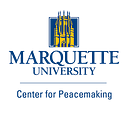Student researchers turn class project into book on interfaith dialogue in Milwaukee
When Dr. Irfan Omar assigned his graduate level theology class a research project on interfaith dialogue in Milwaukee, he knew there was a wide range of possible outcomes. It didn’t take long for him to see that his students felt a sense of purpose while working on the research. In fact, it became more than just a research project: Dr. Omar and his students came to see this project as important for historical memory, community relations, and for students at Marquette.
The students started by conducting interviews and compiling articles, documents, and photos. They didn’t have to look far to uncover a rich history of interfaith relations in Milwaukee. In 1980, two Catholic nuns, professors at Cardinal Stritch University, and a Muslim professor from UW-Milwaukee, formed an “official” Christian-Muslim dialogue group with the support of the Archbishop of Milwaukee. It was the first time in Milwaukee’s history a group brought attention to the city’s religious diversity which included Muslim communities and highlighted the need for dialogue.
The story became even more compelling to the students when they learned that this group of pastors and priests, professionals, nuns, professors and others met on a regular basis for nearly 20 years.
In addition to their monthly meetings where they discussed issues of common interest, they organized public events and brought notable Christian and Muslim scholars and leaders to Milwaukee. The group was diverse and included Christian and Muslim men and women from a variety of denominational and cultural backgrounds. In addition to learning from each other, this group focused on building trust and friendships, some of which have lasted to this day.
The more time the students invested into the project, the more they wanted to share their research. The story of this dialogue, which even Vatican officials were aware of in the 1980’s, had become lost to history. The insights the students were gathering from past and present interfaith leaders in Milwaukee seemed too valuable to keep to themselves. With each passing day, this simple class project started to look more and more like a book.
Dr. Omar approached the Center for Peacemaking with a proposal to allow his students to compile all of their work into a book manuscript on interfaith relations, focusing on Christian-Muslim engagement in Milwaukee that would be of equal value to scholars, interfaith practitioners, and the general public.
Four Marquette students received research fellowships from the Center for Peacemaking to continue working on this project.
Dr. Omar shared his thoughts: “Sometimes we don’t realize all the positive things that have happened and are happening all around us. People from different backgrounds have been getting together to engage in social justice projects. The present research project I believe will allow young people to see what has been done earlier and how it has impacted our city and our communities. This research will be a good example for them to know that in advancing inter-religious dialogue, there’s a way for them to make a difference for peace.”
Dr. Omar’s course and this ongoing project have already helped develop new interfaith leaders. Caroline Redick, a Ph.D. candidate in Theology, said of the project: “It was really enriching, because I felt like I was doing research on two different levels at once: my scholarly work and my relational and spiritual life.” Caroline recently presented at an inter-religious dialogue forum held at Marquette. She, along with others in the group, also presented to a community group off campus.
Sundus Jaber (Arts ’17) said that “conducting this research with Dr. Omar and the team has been one of my most priceless educational and inter-religious experiences so far and has meant so much to me. To be able to conduct research on something so close to me as an American Muslim woman who grew up in the Greater Milwaukee Area has had a huge impact on me.” Inspired in part by this project, Sundus is now completing a Master of Divinity in Islamic Chaplaincy at Claremont School of Theology.
